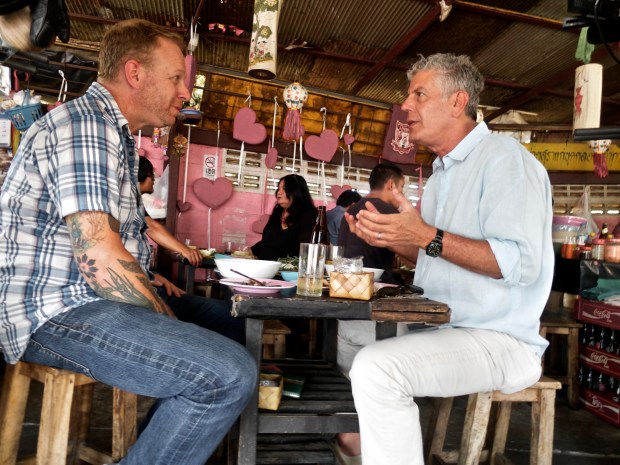Andy Ricker, chef and owner of Pok Pok Restaurants, came up as a cook before it was glamorous. When Kitchen Confidential came out in 2000, he and his colleagues felt validated, he says. “He told our stories and he recognized us as cooks.” Ricker struck up a friendship with Bourdain and in 2014 shot an episode of Parts Unknown with him in Thailand. Ricker spoke with Explore Parts Unknown’s Danielle Renwick about filming the episode, Bourdain’s sage advice, and what he’ll remember about his friend.
Danielle Renwick: When did you first meet Bourdain?
Andy Ricker: It was 2010 and he was on a book tour. He gave a talk at a local hotel restaurant, and when I asked a question, he looked at me and said, “You’re obviously a cook.” It left an impression.
Renwick: Why did that leave an impression?
Ricker: Kitchen Confidential really hit home with cooks like me, who came up at the same time he did, in the 1970s, 1980s, 1990s. It was the first time we’d seen our story told in any way at all. There was no glamour in the kitchen back then.
I’d been in kitchens for most of my adult life, and I’d only ever thought of it as a means to an end, not the end in itself. So then, when Tony wrote that book, we were like, That’s us. This is real. This guy is f*****g real.
And then when I met him, I thought that he saw me the way I saw myself. He was cool as hell. He was a great writer. He told our stories and he recognized us as cooks. He embodied what we were about.
The second time we met was when I was at Pok Pok in Brooklyn. They were shooting the last episode of No Reservations and it was in Brooklyn.
Renwick: You traveled to Thailand together in 2014 to shoot an episode of Parts Unknown. What were some highlights of the trip?
Ricker: Tony was getting into mixed martial arts, and one of the things he really wanted to do in Thailand was see a muay thai fight. One of the fixers on the show said, “If you really want to see a muay thai fight, you’re gonna have to go out into the countryside.” The best places to go are local gyms, where you see the people who are going to be future champions.
So I said, “Let’s try to find one of those.” And we couldn’t. So we ended up going to this one place—a bar completely for tourists—with a couple of dudes in their late 30s who had been muay thai fighters in the past. It was basically a version of muay thai where they take traumatic falls and whack the s**t out of each other.
Tony walked in and looked around and said, “This is bulls**t, isn’t it?”
I said, “Yes. This is bulls**t.”
And he said, “OK, we’re out. You’re not putting me on film here. This would be a disgrace to all the people that are heavy into martial arts.” And he turned around and we walked out.
He had integrity, and he wasn’t willing to compromise for the sake of entertainment. And that’s something that I always really liked about him.
Another day we went to what I consider one of the best restaurants in northern Thailand. It’s just in somebody’s front yard, out in the middle of nowhere. And that’s where we ate lou, which is raw blood soup.
Now one thing I’d noticed about a lot of Tony’s episodes is that he liked to sandbag his guests—especially his friends like Eric Ripert. I told Tony that people had contracted a horrible parasitic brain infection from eating lou, which really freaked him out.
Then I went to the local Thai drugstore, where they have folk remedies, and I found a packet of something with a giant millipede and worms it. It wasn’t a cure for a parasitic infection; it was for something else.
The label was in Thai, so he wouldn’t be able to read it. So I brought it to our next shot and said, “Here’s how you cure your parasitic infection.” It was a total placebo. And I gave it to him in a really serious way, and he was like, Oh, f**k.
I think I told him later on that it was nothing. But it was a good one.

Renwick: How would you say he influenced you or your work?
Ricker: Tony was a great giver of advice.
As a matter of fact, a lot of cooks and chefs out there call him Uncle Tony because he was just, like, the wise f*****g uncle that you can go to for advice. He was no bulls**t. If you were looking for a yes man, you weren’t gonna get it from him. And I think it’s important to have somebody in your life who you can turn to for advice who won’t blow smoke up your ass.
Tony’s influence made me more straightforward, like, tell it like it is.
Renwick: Anything else you want to add?
Ricker: I think that people should remember that as much of a public figure as Tony was—he’s going to be remembered as this famous traveler and writer and raconteur and adventurer—he was also a really good cook. He never scaled the heights to a Michelin star and he wasn’t plating hummingbird assholes with Cistercian blossoms or anything like that, but he was a really solid cook. He understood cooking, and I think that was very much part of his persona.
He was an itinerant friend, a no-bulls**t storyteller, a great cook, and funny. He had a great, very quick sense of humor. That’s how I want to remember him.
This conversation has been edited and condensed.